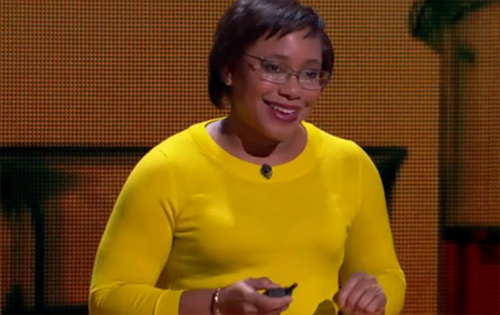Using Nano to Treat Cancer: TED Talk for TV
-
-
Slice of MIT
- 1
Filed Under
Recommended


There’s a new weapon for fighting cancer and it’s about one one-hundredth the size of a human hair. This was the message of Paula Hammond ’84, PhD ’93—head of the Department of Chemical Engineering—on the TED stage as she discussed her work at the Koch Institute for Integrative Cancer Research where she is developing an entirely new method to treat cancer using nanoparticles.
Hammond was one of five speakers featured in TED Talks: Science and Wonder, a partnership series between TED and PBS which recently aired on TV. TED is all about ideas worth spreading, and the work that Hammond is doing certainly is.
In her talk, Hammond explained how manipulating molecules on a nanometer scale can lead to very big results. “We create tiny packages known as nanoparticles that we design to deliver drugs directly to a tumor when injected in the blood stream,” says Hammond. The nanoparticles are layered so that the drug is on the inside and polymer layers surround the drug to prevent the body’s immune system from detecting and expelling the unknown object.
In addition to Hammond, the episode featured other speakers and short films, showcasing an artist’s portrayal of climate change, how science and art converge in 3D at Pixar, a mysterious discovery about camels, and an excerpt from neurologist Oliver Sacks’s last video interview.
The show was a huge success, according to Juliet Blake, producer of TED Talks Live and TED's curator of special projects. “I was keen to produce a science program that was very accessible for people,” says Blake. “I think Paula’s talk is amazing and it really helped explain to people the use of nanotechnology and the work that she does.”
Hammond was thrilled to be offered the opportunity to showcase her work on this platform. While TED is primarily web based, getting nearly a million video views on TED Talks per day, the partnership with PBS, a public network that reaches nearly all households in America, expands the audience and most importantly, the impact.
“Sharing the work we are doing on cancer to as broad an audience as possible is one of the key motivations for doing the TED talk,” says Hammond. “I was especially excited that it would have a TV audience because I hope to reach everyone—including those who have cancer or loved ones who face or have faced cancer, the many Americans who have a chance to learn about how chemistry and engineering can play a role in human health, and the young people who may have a chance to be inspired to study science in the hope of having an impact.”
The TED Talks series, which is a co-production of TED and the Independent Television Service (ITVS) and is funded by the Corporation for Public Broadcasting (CPB), will have additional programs on war and peace (May 30) and on education (September 13) on PBS.








Comments
Gerald Gunia
Tue, 05/10/2016 10:53pm
Research urine therapy please. Thank you